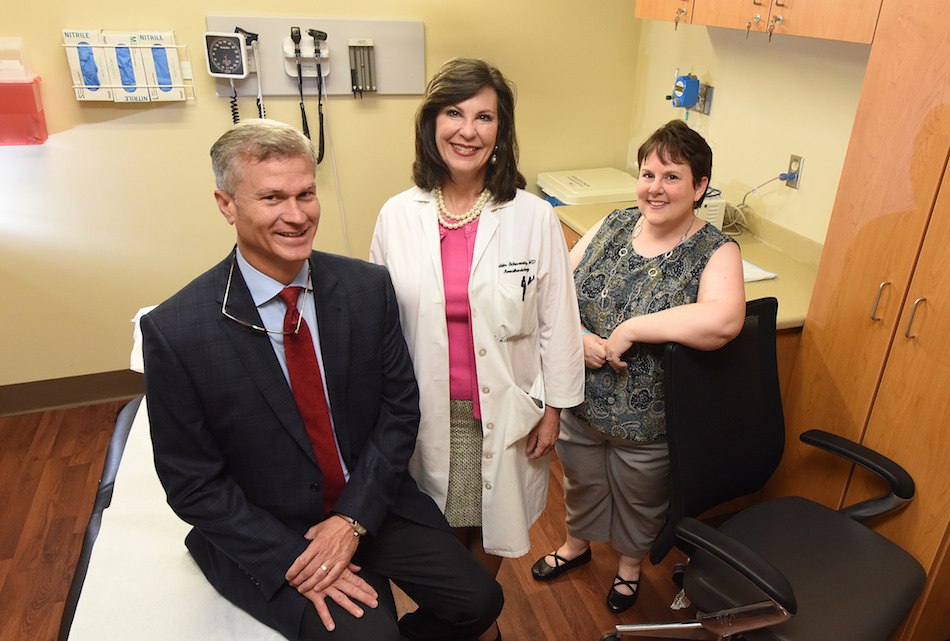Dr. Robin H. Schwartz recruited as first director
Dr. Robin H. Schwartz, an anesthesiologist with extensive experience in operating room management and ambulatory anesthesia, is the inaugural Perioperative Surgical Home Director for the Department of Anesthesiology and Perioperative Medicine at the Medical College of Georgia at Augusta University.
Dr. Alan J. Herline, vice chair of the MCG Department of Surgery and chief of the Section of Minimally Invasive and Digestive Disease, is surgical director for the emerging approach that ensures a continuum of care starting well before and continuing well past a patient’s surgery.
Herline, an MCG graduate and the medical school’s inaugural J. Harold Harrison, MD, Distinguished University Chair, also has extensive experience at Vanderbilt University with this national trend designed to optimize patient outcomes and experience while improving efficiency and reducing costs for hospitals and patients alike.
This model of care greatly extends the work of anesthesiologists, whose care has primarily been focused in the operating room, to also helping ensure patients are in optimal health for scheduled surgeries and have maximum recovery potential.
“It extends the boundaries in both directions,” said Dr. Sarah M.I. Cartwright, quality management coordinator for the Department of Anesthesiology. “It’s a shared responsibility model,” added Schwartz that helps eliminate silos of care, enabling true integrative care by anesthesiologists, surgeons and other members of the health care team that ultimately benefits both patients and providers.
The perioperative surgical home at AU Medical Center is starting with colorectal and bariatric surgery because of Herline’s familiarity with the model, and the team is working toward having the pilot finished in six months before moving onto other surgical services.
As an example of how it works, up to 30 days out from a scheduled surgery, patients are assessed for health concerns such as anemia and smoking that could impact surgery outcomes and receive treatment for those issues. More typically the preoperative workup is done just a few days before surgery, and sometimes surgeries even get canceled because concerning health issues identified then cannot be quickly addressed, something that can be inconvenient or even costly for both patient and providers. Looking farther down the road, the perioperative surgical home also ensures that the patient will have a good place at home or elsewhere to recover.
The model enforces the also emerging model of personalized care that looks at an individual patient’s needs, but also takes advantage of best practices, care approaches that reflect objective evidence of success rather than the tradition of how care has been provided, Schwartz said. As an example, a chest X-ray before surgery that has been the standard to look for heart or lung concerns is now ordered only for specific patients, Herline said. “Everyone does not need one,” he said.
“This is not a shotgun approach that results in over-testing and increasing costs,” Schwartz said. “We are targeting beforehand the things we need for that patient so you are taking that patient to the operating room in the best possible manner from all points of view.”
The model they are working toward will ultimately also include the primary care physician, who knows their patient’s overall health best. “The perioperative surgical home ends up becoming a model for how we provide care in other places,” Herline said. It also is an important model for educating medical students and residents, Schwartz said, and a model of true teamwork.
“It is a shared-responsibility model,” Schwartz said. “At present we tend to have silos of care: the surgeon does his part, anesthesia does our part, nursing does its part, the patient does their part, but there is not integrative care.”
At Vanderbilt, where Herline directed the Colon and Rectal Surgery Program, the perioperative surgical home rapidly yielded measurable signs of success, including reduced length of stay and surgical side effects, while patient quality and satisfaction scores “went through the roof,” he said.
More globally, the American Society of Anesthesiologists launched a Perioperative Surgical Home Learning Collaborative in July 2014 to bring together programs from across the country to refine the model and look at its impact. The emerging program at AU Medical Center is part of the society’s second, two-year Learning Collaborative. Participation will enable about 50 participating health systems – including some that also participated in the first collaborative – to share protocols and learn from each other, Schwartz said. “We are not starting from scratch.”
The second collaborative also includes looking at how the model can impact financial stability for providers in light of newer national payment strategies, such as the Bundled Payments for Care Improvement Initiative of the Centers for Medicare & Medicaid Services, which links payment to multiple services a patient receives for an illness or course of treatment.
 Augusta University
Augusta University




